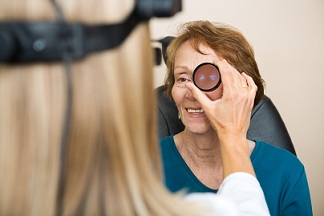Help for failing eyesight, and a boost for normal eyesight

Related topics
Health Innovation Funding Researchers European Research Council Health, Demographic Change and Wellbeing Irelanddate: 18/02/2014
Project: Enrichment of macular pigment, and its i...
acronym: CREST
See also: CORDIS
Contact: http://erc.europa.eu/
“Nutritional pigments at the back of the eye are central to understanding AMD,” explains Professor John Nolan of the Waterford Institute of Technology. In 2011, he was awarded a European Research Council (ERC) Starting Grant for the CREST project, aimed at measuring the impact of these substances on vision.
“The levels of these pigments are suboptimal in many people,” he says. “Deficiencies in meso-zeaxanthin, lutein and zeaxanthin, for example, are known to contribute to the development of AMD.” Macular carotenoid pigments, as they are called, act to filter blue light. “Years of exposure to blue light is known to cause problems,” Prof. Nolan explains, “so these pigments act as a kind of sunscreen for the eyes.”
Early progress
Prof. Nolan says initial work has already helped to identify ways to build macular pigment in the eye. “Formulations containing combinations of meso-zeaxanthin, lutein and zeaxanthin are now widely available; sold commercially as dietary supplements and promoted as enhancing eye health.”
Part of the challenge for the CREST team is to measure any improvements in eyesight delivered by these supplements: “What we need is level-one evidence for the medical community – that means clinical trials, like the ones we are carrying out in CREST.”
Prof. Nolan is particularly interested in showing how macular carotenoid supplements can slow the advance of symptoms in patients suffering with AMD. But he is also looking into the very interesting question of whether these substances can actually enhance vision in normal healthy individuals, pushing eyesight into the realm of ‘super-vision’.
“This project has assembled a specialist team and the advanced equipment needed to go beyond familiar opticians’ tests,” Prof. Nolan explains. “The standard tests using black letters on white backgrounds are not sensitive enough to measure improvements in people with normal vision. With our tests we are assessing the whole bracket of visual performance – daytime, night time, contrast, glare, colour vision, etc.”
Prof. Nolan cites the case of a well-known golf pro who used special, blue-filter contact lenses to improve vision and hence golfing performance while on the links. “Enriching the eye with these pigments is like putting a blue light filter inside the eye itself,” he explains. “Removing blue light reduces glare and increases contrast. We could be moving towards high-definition vision, like high-definition TV.”
Foreseeing huge potential
Demonstrating the ability to improve vision in normal people, Prof. Nolan says, could have far-reaching implications indeed: “AMD represents €133 million is costs in my country of Ireland alone,” he says. “So the potential impact of this work in economic terms is significant. But we are also looking at improving eyesight for people working in many fields – in the sporting community but also in the security forces, police and firefighters, aeroplane and helicopter pilots. Macular carotenoids are a big deal!”
Prof. Nolan adds that ERC funding has been instrumental in helping CREST to become a world-leading centre of excellence in macular carotenoids science, with a broadening network of collaborators across Europe and beyond. “With our results,” he adds, “we will be in a position to better inform European policy and policy-makers, feeding into the patent treatment process.”
